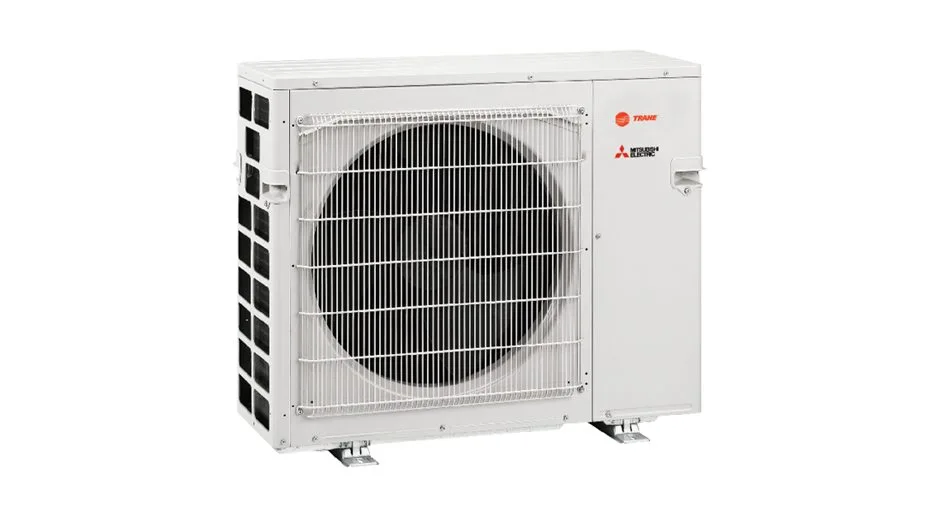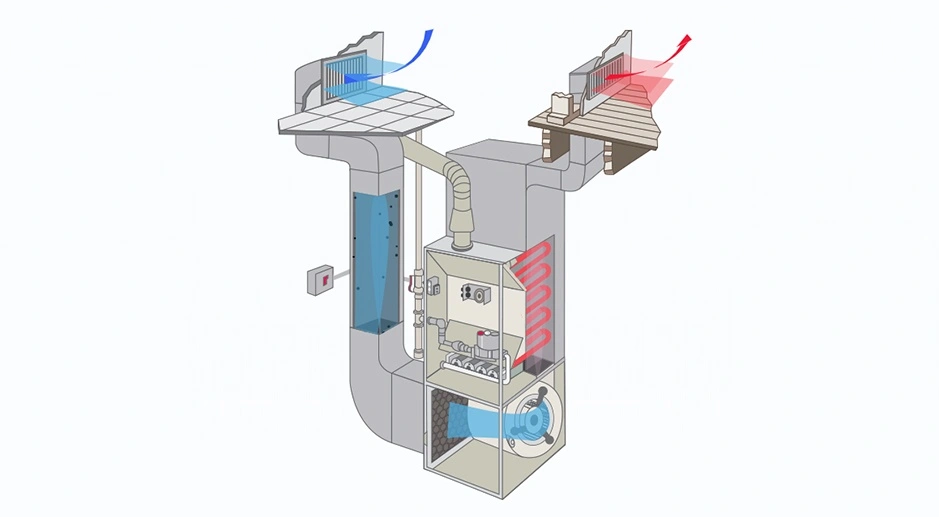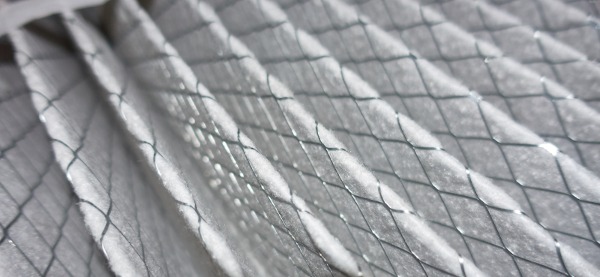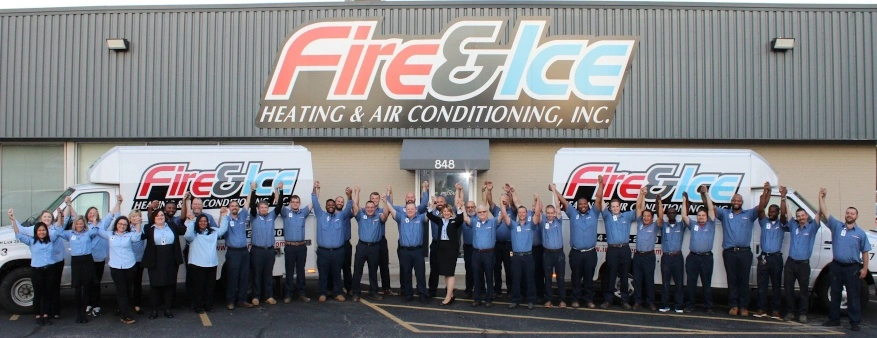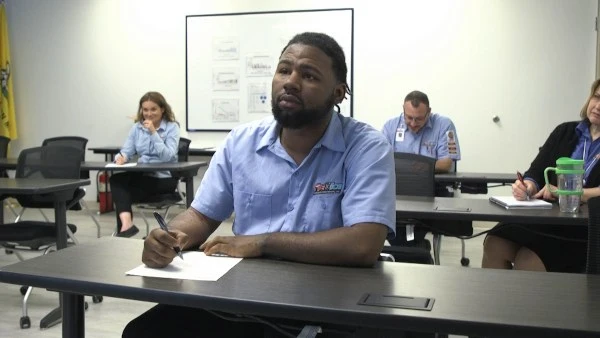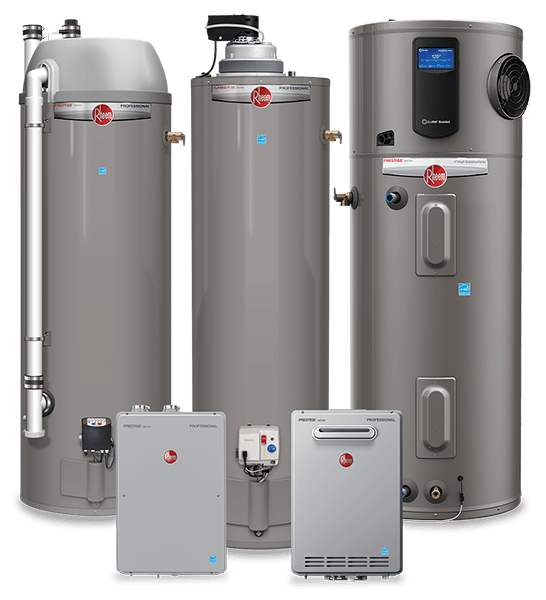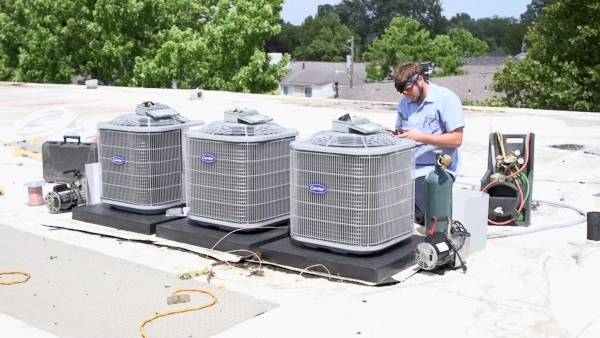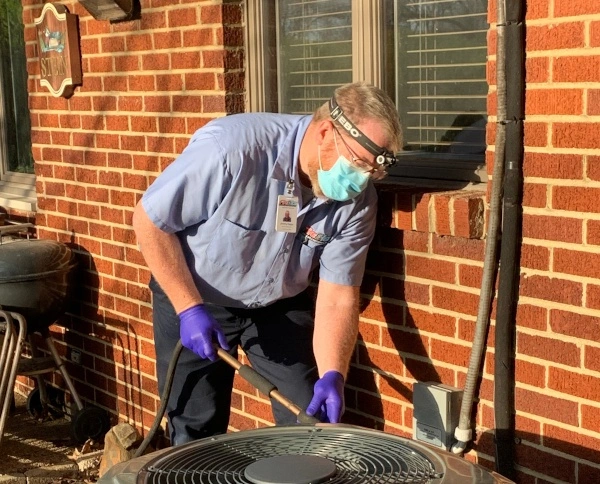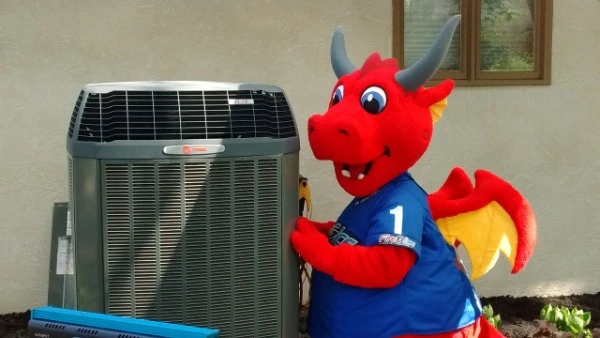


Author:
Revised:
June 2nd, 2023
If there are changes in the way your heat pump operates, it can be challenging to figure out the issue. For example, you may notice a difference in airflow from some of your registers. Maybe your heat pump is running longer - or shorter - than usual, or has ice buildup. These are all signs that you need to be prepared for a potential replacement or expensive repair.
Join Our Newsletter
Receive our newsletter which includes special deals, news, and more.
I consent to the terms below
By submitting this form and signing up for texts, you consent to receive customer care and marketing messages from Fire & Ice at the number provided, including messages sent by an autodialer. Consent is not a condition of purchase. Msg & data rates may apply. Msg frequency varies. Unsubscribe at any time by replying STOP or clicking the unsubscribe link (where available). Reply HELP for help. Privacy Policy
At Fire & Ice, we’ve worked on hundreds of HVAC systems in Worthington, OH, and have seen every problem imaginable. But unless we’re performing regular maintenance and discover a problem, we rely on you to alert us when you feel something is wrong.
If you alert us to a minor problem that can be fixed quickly, you can keep your system from breaking down completely and may have saved yourself a later repair bill in the thousands.
In this article, we discuss the most common changes in your heat pump’s performance that may signal an issue.
7 Signs Your Heat Pump Might Need Repairs
1. Heat Pump Takes a Lot Longer to Heat and Cool
This might not be obvious until there’s a hot spell when the outside temperature lingers above 90 degrees for days at a time. When the heat pump runs continuously, it’s giving you a signal that something is wrong.
Over time, the heat exchanger can accumulate dirt, soot, and other debris.F In Central Ohio, we see this a lot with cottonwood seeds. This means that your heat pump has to work harder and run longer to cool your home. Your HVAC technician can address this by cleaning your heat exchanger.
2. High Electricity Bill
A lot of factors could be causing your heat pump to lose efficiency. Before you blame your hard-working heat pump for your high electricity bill, try one thing first.
Check your air filter. It will be in a small compartment located right next to your furnace or air handler. If you don’t have a record of it being changed, you might be in for a shock. We’ve been in many homes on a service call, and the only thing that needed to be “fixed” was a filter that was clogged with dust and debris.
That makes everything in your system work harder, which means that your electricity bill will spike. The worst part is that the cost of running your system will increase so gradually, you may not notice the change. (A clogged filter also worsens the indoor air quality. You’ll be breathing in more dust and germs than you should.)
If the filter is clean and there is a spike in your energy cost, your heat pump may have failing parts or parts that need lubrication or realignment.
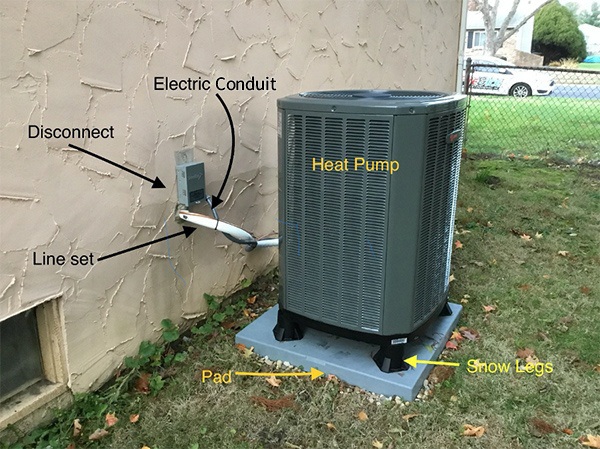
3. Strange Noises Coming from Your Heat Pump
First, let’s rule out the noises that are either coming from somewhere else or aren’t an issue. Modern heat pumps are designed to run at about 40 - 70 decibels. The most expensive models are generally the quietest models. Forty dBs is a normal conversation; 70 is comparable to a washing machine or a dishwasher.
If the heat pump is louder than that, you might want to investigate further.
Second, a whistling sound coming from inside the house is most likely a hole in your duct system. This is common, as time and gravity can weaken the seals in the ductwork. That can probably be fixed with proprietary products or mastic. (NOT duct tape, despite the name. It won’t last.)
Read more: Air Conditioner and Heat Pump Noises: A Complete Guide
If the noise is coming from the heat pump itself, the odds are that it’s either the compressor or the outdoor fan.
If the condenser coil is plugged or dirty, the compressor isn’t going to be able to pull enough air through the system to function normally. The pressure will have to increase to compensate. This, in turn, can throw several components off.
It can sound like your air conditioning system is ready to blow up.
The inside contactor can start buzzing if it’s working improperly. (A contactor is a device that controls the flow of electricity to your heat pump.) If the blade in the outdoor unit is off-kilter, it can produce a loud hum. Or maybe something is stuck in the motor or fan, which can produce clanking.
Your options are having it repaired, or replacing it altogether.
Join Our Newsletter
Receive our newsletter which includes special deals, news, and more.
I consent to the terms below
By submitting this form and signing up for texts, you consent to receive customer care and marketing messages from Fire & Ice at the number provided, including messages sent by an autodialer. Consent is not a condition of purchase. Msg & data rates may apply. Msg frequency varies. Unsubscribe at any time by replying STOP or clicking the unsubscribe link (where available). Reply HELP for help. Privacy Policy
Not doing anything about it can cause you discomfort and sap the efficiency and life out of your heat pump. And this small issue could turn into a major - and expensive - one.
If your heat pump is 10-15 years old, parts may be harder to come by, or a repair may cost more than it’s worth. A conversation about replacing the unit is probably warranted.
On the other hand, that same issue in a 3-year-old system is probably worth repairing.
Read more: The Cost of Waiting to Repair or Replace HVAC Equipment
4. A Muggy Feeling in the Summer
Your heat pump doesn’t just cool the house in the summer by removing hot air. It also removes humidity. And if there’s a problem, the indoor moisture might creep up past comfortable levels. If you have a thermostat that can track the indoor relative humidity, keep an eye on it.
Here in Ohio, we are no stranger to hot, humid days. When it’s steamy out, your heat pump will need to run longer and longer to keep the indoors cool. A temperature of 90 with 40 percent relative humidity will net a heat index of only 91 degrees, but it spikes to 105 degrees with a relative humidity of 70 percent.
Even the best, most expensive, new heat pump will be able to create a difference of only about 20 degrees from the outside temp to the inside. If it’s 90, your heat pump can’t do much better than about 70 inside.
But if you find yourself cranking down the thermostat to try to keep your cool, it could be an indoor humidity issue. It could be a sign of a heat pump that’s failing.
5. An Ice Buildup on the Heat Pump
Ice can form on your heat pump if the refrigerant falls below freezing, caused by faulty wiring or a dirty coil. This will cause poor performance and even complete failure. Scraping or chiseling ice from your unit could exacerbate the problem. It needs to defrost and the problem causing the ice needs to be addressed by a professional.
In the winter, it’s normal to see a thin layer of ice on your outside unit. Whether heating or cooling your home, heat pumps create condensation. And in winter, cold temperatures can freeze the condensation on your outside unit.
How much ice is too much?
- There’s more than a thin layer of ice covering the sides and top of your heat pump
- The ice remains on your outdoor unit for one day or longer without defrosting
- You notice abnormally high electric bills
- Your heat pump is much louder than usual
- Your heat pump starts but doesn’t run
- Your heat pump doesn’t turn on at all
Read more: Why Is My Heat Pump Covered in Ice?

6. Water Pooling Near the Furnace or Air Handler
If you notice water near your furnace or air handler during the summer, the seal on your evaporator coil could be compromised. Your evaporator coil is the indoor component of your heat pump.
Your evaporator coil produces moisture – that’s why your heat pump has a drain. But if it isn’t properly sealed, this moisture could leak onto and around your furnace or air handler.
The most common reason for water under your furnace is a clogged condensation drain. Your HVAC partner should be able to do an evaluation and ensure that your furnace isn’t damaged.
7. Unusual Smells Are Coming from the Vents
Dirty Sock Syndrome is caused by mold and bacteria built up on your heat pump. Specifically, this buildup occurs in the system’s evaporator coil, housed indoors.
Basements are typically damp and dark. These are the perfect conditions for mold and bacteria growth. While a heat pump is designed to handle moisture, the internal components can become dirty and accrue dirt and other particles like anything else in the home.
For mold and bacteria to accumulate, they need organic material and moisture. The dust and dirt that exist throughout any home, and the particulates collected by air filters, provide plenty of organic materials. (Most house dust is made of dead skin cells.) Unfortunately, the other part of the equation is moisture, which can be found in most homes, particularly during humid months. The result is a powerful odor that smells like unwashed socks.
The drain pan can become plugged up or sometimes start collecting dirt that can lead to bacteria or mold. Ensuring that it’s clean is an excellent precautionary measure.
Will Your Heat Pump Run Without Repairs?
If your system is currently running, but you’ve noticed a drop in heating or cooling quality, or it’s begun to make new noises, it may run fine for a day, or maybe it can run for five years. It might not be as efficient as it can be, but it can run. Repairs can be put off, but you might be facing a more extensive repair bill later.
The best case is that you have a system that’s a little noisier than it once was. While it may not last another five years, it could continue to run for several years with regular maintenance. A simple repair could have your system running smoothly again.
The worst case is that the noise is coming from something affecting the integrity of the entire system. In addition, a simple repair may not be enough; if a major component needs to be replaced, you might be facing a bill that’s well over $1,000.
Sometimes the unit can run, and if it’s monitored, it won’t pose an immediate risk to the entire system’s operation, but you’ll lose efficiency and comfort in the process.
It’s important to remember the lifespan of a heat pump is about half that of an air conditioner or furnace. This is because your heat pump does double duty, heating and cooling. Furnaces can last 25 years or more. A heat pump lasts 15 years on average.
Heat Pump Repair Options in Worthington, Ohio
While regularly changing your filter and scheduling regular heat-pump maintenance is good advice for any system, if you’re dealing with odors or a new noise, it’s time to schedule an appointment with a technician.
Skipping this could mean a loss of comfort, a higher electric bill, or even the failure of your system. Having a conversation with a licensed HVAC company is an excellent first step.
At Fire & Ice, we take pride in doing the work thoroughly the first time, every time. Whether it’s a repair or replacement, we have the expertise and knowledge to get your system working quietly and efficiently to provide maximum comfort to your home.
Are you ready to schedule an in-home service? If you’re in Worthington, OH, or the surrounding area, reach out to us today.


